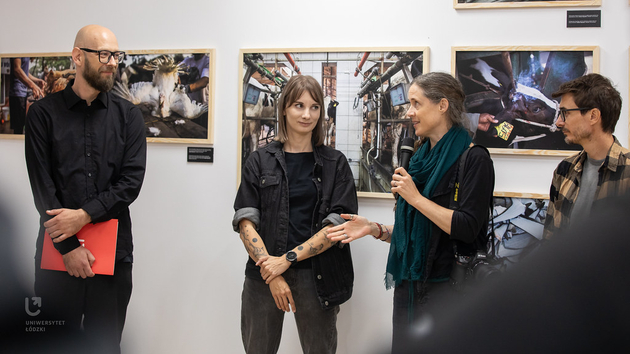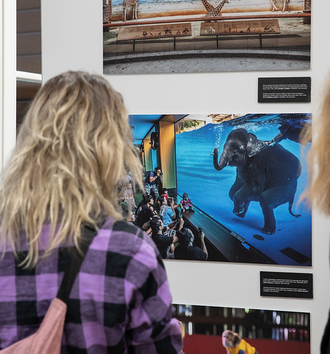"HIDDEN – Animals in the Anthropocene" is an exhibition created by Canadian photographer and an activist Jo-Anne McArthur with We Animals, featuring the works of several photojournalists dealing with animal issues. They documented the exploitation and suffering of, among other things, the so-called farm animals.
The opening of the exhibition took place on 12 September 2024 at the university Wozownia 1/5 Gallery with the participation of the creator of the exhibition and activists involved in the creation of the project. During the evening there was also a discussion with Jo-Anne McArthur and Stefano Belacchi from We Animals, led by Patrycja Chuszcz. A screening of the film by the Otwarte Klatki Association entitled "Out of Sight, by the Forest" directed by Nadina Dobrowolska and documenting the suffering on Polish fur farms was held a week after the opening, on 19 September 2024.
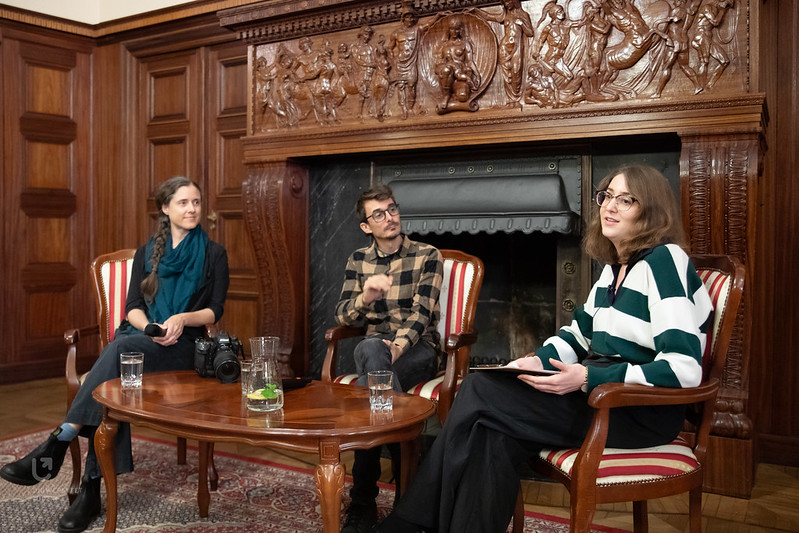 Meeting with the creators of the "Hidden" exhibition: Jo-Anne McArthur and Stefano Belacchi (We Animals), led by Patrycja Chuszcz,
Meeting with the creators of the "Hidden" exhibition: Jo-Anne McArthur and Stefano Belacchi (We Animals), led by Patrycja Chuszcz,
photo: Bartosz Kałużny
Reflection on animal suffering, discussion on actual solutions
I believe that engaged art, such as that presented at the “HIDDEN” exhibition, has an extraordinary power to arouse emotions and stimulate a change in the way of thinking, which was evident in the enormous commitment of the audience who came from all over Poland to see it. I am pleased that the University of Lodz was the first university in Poland to have the courage to take up such a difficult topic. The exhibition was not only an opportunity to reflect on the suffering of animals, but also to discuss actual solutions. I trust that this is the first step towards specific actions and that the discussion on plant-based collective nutrition with the university of Lodz Vice-Rector Dr hab. Katarzyna de Lazari-Radek will bring results in canteens and public procurement
– summed up the project Patrycja Chuszcz, a doctoral student at the University of Lodz Doctoral School of Humanities, involved in the project.
The works presented at the exhibition were an excellent opportunity to consider how deeply our lives are linked to the exploitation of animals – for food, clothing or entertainment – and the consequences this has for their well-being, our planet and human health. The exhibition was a space that forced us to stop and think about how, through our individual decisions and systemic changes, we can build a future based on greater empathy, interspecies justice and sustainable development.
An estimated 80 billion land animals continue to be used and consumed by humans each year. The majority of these animals are raised and killed within industrial agricultural systems. Fish and other marine life are measured by tons. The University of Lodz has joined the project to raise awareness of the processes that bring animals to our tables, make clothes or become testers of the cosmetics and medicines that we use
– explained Maciej Andrzejewski from the University of Lodz, the originator of the idea to present the exhibition at our university and one of the curators of the exhibition.
Courage, respect, boldness and empathy
The cooperation of a university with traditions such as the University of Lodz with an organisation working in the field of animal rights (Otwarte Klatki Association) is a unique event, indicating openness and courage to engage in discussions on the impact of humans on the well-being of other living beings and climate change. Joining this project seemed like an important task that was aligned with my beliefs and goals. It also gave hope that the topic of necessary changes would be taken up
– says Dr Łucja Lange from the Department of Sociology of Art at the Faculty of Economics and Sociology of the University of Lodz, who also participated as an expert in the events accompanying the exhibition.
![Author's meeting about the book "Śmiałość i empatia" [Boldness and Empathy] by Elwira Sztetner and Dariusz Gzyra Author's meeting about the book "Śmiałość i empatia" [Boldness and Empathy] by Elwira Sztetner and Dariusz Gzyra](/fileadmin/_processed_/3/e/csm_hidden_%C5%9Bmia%C5%82o%C5%9B%C4%87_i_empatia_7a0eb31df3.jpg) A conversation with the authors of the book "Śmiałość i empatia" [Boldness and Empathy] – Elwira Sztetner and Dariusz Gzyra,
A conversation with the authors of the book "Śmiałość i empatia" [Boldness and Empathy] – Elwira Sztetner and Dariusz Gzyra,
led by Dr Łucja Lange, photo: Maciej Andrzejewski
One of such events was a meeting with Elwira Sztetner and Dariusz Gzyra, authors of the book "Śmiałość i empatia" , which was held on 26 September 2024. It was led by Dr Łucja Lange:
During our conversation, many examples of speciesism, unequal treatment and the use of violence were mentioned – yet these behaviours are completely normalised and do not cause reflection in most people. The vegan view of the world is a view stripped of the uniqueness of the human position, of superiority to other entities. We wondered how to show this suffering, violence and inequality in order to convince, to encourage change and how to commemorate animals perceived as masses and as individuals. After this conversation, I was left with the image of grease stains in front of restaurants, which Dariusz Gzyra perceives as traces of the existence of animals intended for consumption.
The scientist also added:
The involvement of students in the international Plant-Based Universities project is a good solution that is already happening [Plant-Based Universities Łódź — we encourage you to follow the profile on social media].
Plant-based cuisine – how to introduce changes in your life and on your plate
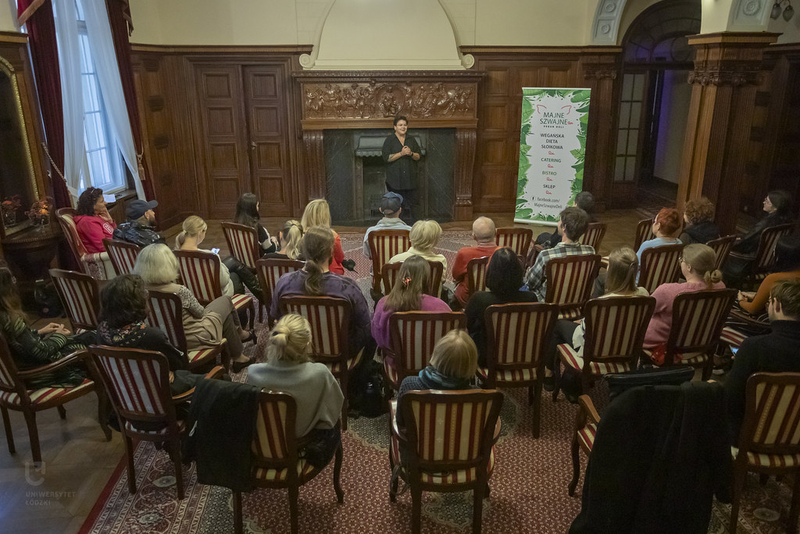 Meeting about vegan cuisine led by Kaja Bilska, photo: Maciej Andrzejewski
Meeting about vegan cuisine led by Kaja Bilska, photo: Maciej Andrzejewski
What is plant-based cooking all about and who is it for? Are meatless dishes tasty? How to introduce changes in our lives so that they cost us as little as possible? This, and not only that, was the topic of discussion held on 13 October 2024 at the Biedermann’s Palace by Kaja Bilska who is an educator, an author of over 2,000 workshops on good communication and a chef at Majne Szwajne in Lodz in the years 2019-2022.
She talked about her personal experience of working in a plant-based kitchen and the philosophy that accompanies her cooking, based on simple, home-cooked flavours known from childhood. She also debunked several myths about veganism, proving that the path to meatless cuisine doesn't have to be as difficult as it may seem. She talked about where the belief comes from that plant-based cuisine is not filling, why it is sometimes more expensive and how to make it delicious and a bit cheaper, and why our physical strength does not depend on the consumption of animal protein.
When cooking, it is important to be aware and attentive, as well as to listen to the needs of our body. But food is not everything! Self-development and inner readiness to act are important elements of the change process – not only nutritional ones. A very important role is played by the joy of making conscious choices, as well as the awareness of our internal blockages that often stand in the way of taking action in life. In every change process, the role of conscious communication is also important
– explained Kaja Bilska.
Sustainable development, i.e. it's not just about food
Reflection on the directions of sustainable development of universities, reducing the consumption of animal products, as well as the possibility of ceasing animal experiments – these are the topics that were discussed during the debate "Revolution or Evolution? What Sustainability Means for Our University."
The conversation, which took place on 17 October 2024, was attended by:
- dr hab. Katarzyna de Lazari-Radek, Associate Professor at the University of Lodz – the University of Lodz Vice-Rector for Internationalisation of Science and Education who is a philosopher/an ethicist,
- Dr Łucja Lange – a sociologist, Faculty of Economics and Sociology, University of Lodz,
- Dr Agata Rudnicka-Reichel – an expert in the field of social responsibility and sustainable development, Faculty of Management, University of Lodz,
- Alicja Bućko – Political Advocacy Manager at RoślinnieJemy, an expert of the RoślinnieJemy campaign in the area of food system transformation. She has been creating a systemic vision of a plant-based future in Poland,,
- Jakub Hendzel – University of Lodz Doctoral School of Humanities, a student involved in the grassroots campaign and promotion of Plant Based Universities.
The discussion was moderated by Bartosz Zając who is an activist of the Otwarte Klatki Association, a coordinator of the Social Coalition "Stop Industrial Farms".
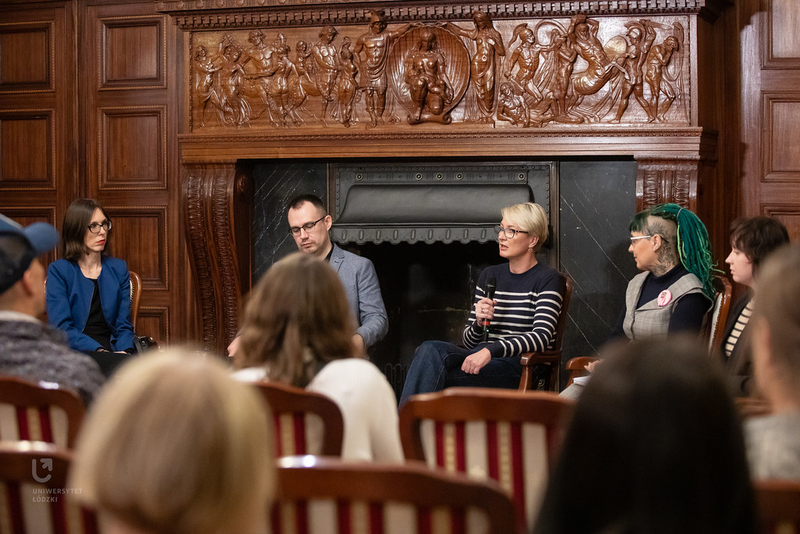 Discussion panel "Revolution or Evolution? What Sustainability Means for Our University" Photo: Bartosz Kałużny
Discussion panel "Revolution or Evolution? What Sustainability Means for Our University" Photo: Bartosz Kałużny
The conversation has been recorded and can be watched on the UniLodz YouTube channel. Below we present excerpts of statements made during the event.
Dr Agata Rudnicka-Reichel – expert in the field of social responsibility and sustainable development, Faculty of Management, University of Lodz:
We have come here to talk about animal rights but let us remember that animal rights are one of many issues related to sustainable development. (...) There is a lot going on at the university, this is organic, grassroots work. The “21st Century Challenges” class, which anyone could sign up for and take part in without any points is a notable example from the last few years. There are more and more such grassroots educational activities. The “Dywers” project, which shows sustainable development in various aspects – both social and environmental is another example.
Dr hab. Katarzyna de Lazari-Radek, Associate Professor at the University of Lodz – the University of Lodz Vice-Rector for Internationalisation of Science and Education:
These are changes that need time. As a university, we are heading in the right direction. I would actually consider how to introduce these changes. You have to think about what works – not just what is right, what is wrong, what is bad, what is good, but how to convince people of it. Referring to your own well-being and health will probably have the best effect. We met to start this discussion. It is important that no one feels excluded from this discussion.
We are in the process of change
The “Hidden” project, which includes the exhibition “HIDDEN – Animals in the Anthropocene” and its accompanying events, has become the beginning of a broader social and academic discussion at our university. It could be summed up by the words of Dr Agata Rudnicka-Reichel, spoken during the debate:
Sustainable development appears both through the inclusion of this topic in classes and at the level of everyday practice. Let's remember that this is a process. We definitely need to work out different solutions. We need organisational and systemic support, as well as the support of the entire academic community that will start achieving one goal – sustainable development.
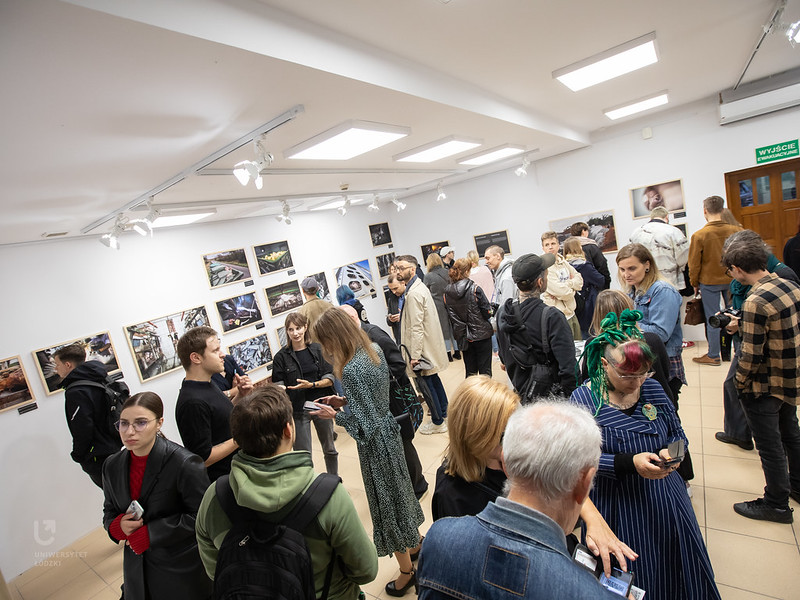 The university Wozownia 1/5 Gallery during the opening of the exhibition "HIDDEN – Animals in the Anthropocene",
The university Wozownia 1/5 Gallery during the opening of the exhibition "HIDDEN – Animals in the Anthropocene",
photo: Bartosz Kałużny
More materials about the project:
- Photo report of the opening of the exhibition "HIDDEN – Animals in the Anthropocene" (12 September 2024),
- Meeting recording (in English) with Jo-Anne McArthur and Stefano Belacchi – activists and photographers associated with We Animals, led by Patrycja Chuszcz (12 September 2024),
- Photo reports of the events accompanying the exhibition "HIDDEN – Animals in the Anthropocene" – screening of the film "Out of Sight, by the Forest", meeting around the book "Śmiałość i empatia", meeting with Kaja Bilska (September –October 2024),
- Photo report of the debate "Revolution or Evolution? What Sustainability Means for Our University." (17 October 2024),
- Recording of the debate "Revolution or Evolution? What Sustainability Means for Our University." (17 October 2024).
Source: Łucja Lange, Kaja Bilska, Patrycja Chuszcz, Bartosz Kałużny,Communications and PR Centre, University of Lodz
Photos: Bartosz Kałużny, Maciej Andrzejewski – Communications and PR Centre, University of Lodz
Edit: Agata Dawidowicz, Communications and PR Centre, University of Lodz

